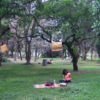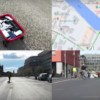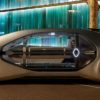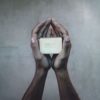[urban interfaces] Blogs

Meditation or Friction?
Written by Hymke Theunissen We face a crisis of imagination. These are the words of Roy Bendor (2018, 132). Bendor refers specifically to our inability to imagine what a sustainable future might look like. Before we know what measures to take, socially or economically, we first need to be able to image an alternative…
Read more
Imagining Dark Ecologies
Written by Aishwarya Kumar In his chapter Imagination, Roy Bendor (2018) posits that imagination appears to be “essentially incomplete,” in that it is suggestive, does not predetermine the outcome of the intervention. Bendor elaborates on the various ways these “unfinished media” perform, in that they “engage, evoke, provoke, or stir their users’ imagination”…
Read more
Virtual Traffic Jam, Material Urban Ecology
Written by Jueling Hu Simon Weckert’s artwork Google Maps Hacks offers us an angle to understand the way we perceive the surrounding environment through media technologies. It materializes the interactions between human and non-human actants. In doing so, on the one hand, this work questions how we construct a media ecology through technological devices…
Read more
Sociotechnical Imaginaries on The Futures of Urban Mobility
Written by Mavi Irmak Karademirler Dutch Design Week takes place every year in Eindhoven. In October 2019, the Design Week was organized around an urgent slogan: “If not now, then when?” The Design Week features design processes and design explorations which work with different materials, methods and techniques with a focus on future-oriented design…
Read more
The Sociotechnical Imaginary of the Human Soap
Written by Yotam Rozin FROM PEOPLE, FOR PEOPLE, the slogan was slickly displayed in a bold geometric sans-serif font on the clean white walls of an exclusive new concept store SELF by Julian Hertzel, alongside large LED screens with high-end promotional videos for its products. The pop-up store, by one of Europe’s most celebrated…
Read more
